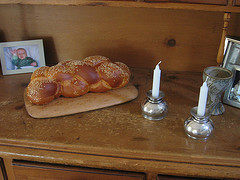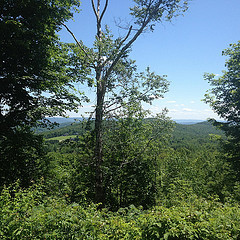Rachel Barenblat's Blog, page 185
June 30, 2013
Welcome home to a place where you've never been
Anytime I enter a place where my Jewish Renewal community has gathered, it feels like coming home.
Part of that is the experience of seeing old friends and beloved teachers (many of whom are now old friends, too!) And that makes sense. I spent a few years going to every ALEPH retreat I could afford while I was in the discernment process about the rabbinic ordination program. I wanted to meet teachers and students and deans and ask questions and begin to suss out whether this was the right place for me (and whether they felt I was the right kind of candidate to apply.)
And then there were the five-plus years of fulltime rabbinic school, when I saw these folks at least twice a year for intensive one- or two-week-long residencies, and for programs like DLTI, and in between those times I took classes every week via teleconference (and davened via teleconference for a while, too!) and did hevruta learning via Skype and and and and. Some of the deepest and most intense learning I've ever done, I've done with these friends. These people are an intimate part of my life in all of those ways. The reason it feels like a family reunion is that it is one.
But I've had this feeling of coming-home to Jewish Renewal since my very first retreat at the old Elat Chayyim, back when I didn't know anyone here at all. Probably since the first time I sat down at a meal with strangers, and they smiled at me and welcomed me and wanted to know my story (Jewish and otherwise) and what had drawn me to that place. Certainly since my first Jewish Renewal shacharit service the next morning, in the white yurt, sitting cross-legged in a circle on the floor, learning my first liturgical chants, unaccountably moved at the sight of women wearing tefillin.
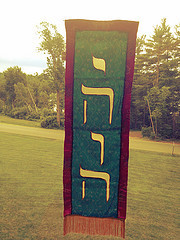 Have you ever heard anyone say "Welcome home to a place where you've never been?" That was how it felt for me, the first time I gathered with my Jewish Renewal chevre. Here were people who cared about Judaism, who cared about God, who blended the passionate God-focus of Hasidism with the kind of feminism and social justice underpinnings I hold dear. I struggle to describe it; ultimately it's a feeling, an experience. I have always been quirky, spiritual, different. From the moment I first set foot in a Jewish Renewal retreat setting, I could tell that I wasn't alone. I knew that I had found my spiritual tribe.
Have you ever heard anyone say "Welcome home to a place where you've never been?" That was how it felt for me, the first time I gathered with my Jewish Renewal chevre. Here were people who cared about Judaism, who cared about God, who blended the passionate God-focus of Hasidism with the kind of feminism and social justice underpinnings I hold dear. I struggle to describe it; ultimately it's a feeling, an experience. I have always been quirky, spiritual, different. From the moment I first set foot in a Jewish Renewal retreat setting, I could tell that I wasn't alone. I knew that I had found my spiritual tribe.
I remember a conversation with my mother at Pearlstone a few years ago, when I was still a rabbinic student, when our son was an infant and my mother had come with me to a rabbinic student intensive to provide childcare while I was learning. Midway through that week, I remember her turning to me, and saying, with some wonderment, "I think everyone here is a spiritual seeker!" It's most true in the ordination programs, of course; no one goes through the rigors of rabbinic school (or cantorial school, or the rabbinic pastor program) without a powerful spiritual motivation. But I think it's true across the board at Jewish Renewal gatherings, or at least it tends to be.
The Kallah moves around every two years, so each time it happens, it's convenient for someone. This year, it's convenient for me. Two years ago we were in California; this year we're a scant two and a half hours from my house. In assiyah, the world of physicality, I haven't traveled very far at all. But in the worlds of emotion and spirit, I've tessered into that magical space where everyone smiles at strangers, where conversations about prayer and mysticism don't draw a raised brow from anyone, where shouting "Hello, rabbi!" causes people all over the room to turn around. Into this space where, as soon as we're all together again, it's as though we had never been apart at all.
June 27, 2013
It's almost time for Kallah!
The ALEPH Kallah is almost here! I can't wait.
First and foremost, I'm thrilled to be teaching a class. My materials are prepared and I'm looking forward to meeting the students who are new to me and re-meeting the folks who I already know.
I'm also delighted to be honored with the opportunity to be part of the opening plenary session on Monday night. Four people will share our thoughts on the theme of Kol Echad, "One Voice." (I'll share my remarks here after the fact, so if you're not going to be at the Kallah, stay tuned.)
Most of all, I'm eager to immerse myself in the temporal mikveh of a week with my Jewish Renewal community: friends, conversations, davenen, song, and joy. For those who are joining us in New Hampshire next week, travel safely! And if you're not registered for the Kallah but are still considering coming, you can still register; as this Kol ALEPH post notes:
With over 500 souls registered, this is on track to be the biggest
Kallah since Albuquerque, New Mexico in 2007. Over 600 are expected in
Rindge, New Hampshire for our lakeside retreat in the shadow of Mt.
Monadnock. There is still time to register - right up until July 1st for
the full conference, or July 5th for the Shabbaton! But why wait? “Lech
lecha”- get yourself right now to the Kallah website and get registered, and get ready to enjoy one of the best weeks of your life. What are you waiting for?
June 26, 2013
On yesterday's grief and today's rejoicing
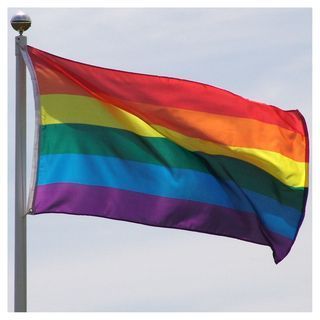 What a rollercoaster of a week. Yesterday the Supreme Court of the United States handed down a ruling which gutted the Voting Rights Act. That ruling was a major blow to minority voters in this country, and to all who recognize that voters of color in many places still face extraordinary hurdles in getting to the polls on voting day. And today SCOTUS handed down the ruling [pdf] that the Defense of Marriage Act is unconstitutional. Yesterday's ruling was devastating; today's is a source of joy.
What a rollercoaster of a week. Yesterday the Supreme Court of the United States handed down a ruling which gutted the Voting Rights Act. That ruling was a major blow to minority voters in this country, and to all who recognize that voters of color in many places still face extraordinary hurdles in getting to the polls on voting day. And today SCOTUS handed down the ruling [pdf] that the Defense of Marriage Act is unconstitutional. Yesterday's ruling was devastating; today's is a source of joy.
Today's victory for human rights doesn't undo yesterday's damage. The two issues -- minority voting rights, and the right to marry one's beloved -- intersect, and the communities impacted by these decisions intersect and overlap. The work of perfecting our flawed democracy, of eliminating prejudice and discrimination, of ensuring that everyone has full and whole access to the equal rights which are our God-given inheritance as human beings (including both the right to marry and the right to vote): that work remains ahead of us. The road to liberation is long and there are miles to go before we sleep.
But Jewish tradition teaches us to celebrate our victories, even when there is still further we need to go. As we read in my haggadah:
What does this mean, "It would have been enough"? Surely no one of these would indeed have been enough for us. Dayenu means to celebrate each step toward freedom as if it were enough, then to start out on the next step. It means that if we reject each step because it is not the whole liberation, we will never be able to achieve the whole liberation. It means to sing each verse as if it were the whole song -- and then sing the next verse.
[That quote comes from The Shalom Seders, compiled by New Jewish Agenda, (New York, Adamah Books, 1984.)]
Today's step toward freedom is a big one. Today's ruling argues that "interference with the equal dignity of
same-sex marriages" was DOMA's essence, and that such interference is unconstitutional. (I would also add, unconscionable.) This is a victory for GLBT Americans, for binational queer couples who will no longer be forced overseas because they can't get a spouse visa, and for everyone who believes that love should be honored and that commitment should be celebrated. Today, we celebrate! And tomorrow we roll up our sleeves and rededicate ourselves to fixing what's still broken.
The work of ensuring equality is not done. When any of us faces institutionalized discrimination, our whole nation is diminished. Yesterday's ruling on the VRA should galvanize us to work toward ending racism and prejudice, both on the micro level (individual people) and the macro level (systemic racism and inequality across the board). And today's ruling on DOMA is still only a step toward true marriage equality; remember that while same-sex marriage is legal and honored in many states, it's not yet legal and honored everywhere in this country. We're not there yet. But I am endlessly grateful for today's ruling and for the ability to hope that we can continue to perfect our imperfect union.
Jewish tradition offers a blessing for moments like this one: ברוך הטוב והמטיב (Baruch HaTov VeHaMeitiv). "Blessed are you, God, who is good and who does good!" Amen, amen, selah.
June 25, 2013
17 Tammuz, justice, and broken walls
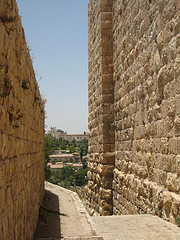 Today is 17 Tammuz, a minor fast day in Jewish tradition. Today we enter into the Three Weeks, also called Bein Ha-Meitzarim, "In the Narrows."
Today is 17 Tammuz, a minor fast day in Jewish tradition. Today we enter into the Three Weeks, also called Bein Ha-Meitzarim, "In the Narrows."
On this day, we remember the first breach in the walls of Jerusalem during a long-ago siege of that holy city, the first step toward the destruction of the Temple three weeks later. On this day, we remember the shattering of the first set of tablets which Moshe brought down from Sinai. When he saw the children of Israel worshiping the golden calf, he smashed the tablets in sorrow and despair.
On this day, we allow ourselves to be conscious of what's broken. Moshe's heart broke when he saw his community choosing idolatry and wickedness. My heart breaks when I read that the Supreme Court has struck down parts of the Voting Rights Act. (See SCOTUS decision, pdf. For context, see Do we still need the Voting Rights Act?, PBS and Why we still need the Voting Rights Act, Washington Post.)
"In 1965, the states could be divided into two groups: those with a recent history of voting tests and low voter registration and turnout, and those without those characteristics...Congress based its coverage formula on that distinction. Today the nation is no longer divided along those lines." (That's from the decision itself.) Halevai -- would that it were so! But I do not believe that racism is over. (Neither do the researchers behind this study, released last month.)
The New York Times notes that although the Court upheld Section 5, which protects voters in the places where discrimination has been the worst, "without Section 4, which determines which states are covered, Section 5
is without significance — unless Congress chooses to pass a new bill for
determining which states would be covered." I fear that leaving it to Congress to reach consensus on where discrimination happens (before steps can be taken to ameliorate the discrimination) is tantamount to inaction. And inaction means that the discrimination can not only continue, but flourish.
17 Tammuz was the day when the walls of Jerusalem began to fail. Where are the places in our world today where the walls of human rights, the walls of justice, the walls of empathy and compassion are cracking and becoming unsound?
Whether or not you're fasting today; whether or not you were even aware, before you read this post, that today was the fast day commemorating the breaching of those long-ago walls; whether or not you place stock in the traditional teaching that today is the anniversary of the day whe Moshe smashed those tablets of stone -- don't let today pass you by. Don't look away from what's broken.
I believe that the dates on our liturgical calendar have real meaning. (Whether the meaning is innate in the day itself, or whether it accrues over the course of thousands of years of us investing these dates with meaning, I experience the meaning either way.) The spiritual valance of today, on the Jewish calendar, is brokenness. Today is a day to let our hearts break when we see what's wrong in our world. Don't fight it; experience it.
And -- because there is always a next step -- then gather your courage to do something about it. Hold on to the wisdom of the great sage Leonard Cohen, who wrote "There is a crack in everything / that's how the light gets in." Every breakage is also an opening. May we bring light to this world's broken places, and justice to everywhere marred by its absence. Speedily and soon.
Related:
Rebuilding with our Torah and our hearts, 2012
The Three Weeks: healing our sight, 2012
The photo which illustrates this post is mine; from here.
What we can learn from the daughters of Zelophechad
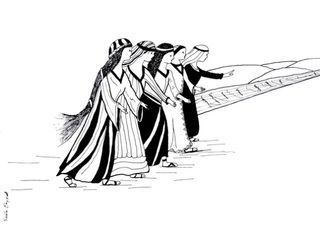
Five daughters of Zelophechad by Sheila Orysiek. [Source]
A fascinating thing happens in this week's Torah portion, which is called Pinhas. The daughters of Zelophechad -- Mahlah, Noah, Hoglah, Milcah, and Tirzah -- come before Moshe. And they say:
"Our father died in the wilderness. He was not one of the faction, Korah's faction, which banded together against the Lord, but died for his own sin; and he has left no sons. Let not our father's name be lost to his clan just because he had no son! Give us a holding among our father's kinsmen!"
Moshe doesn't know what to do. So he brings their case before God directly. And God answers him and says:
"The plea of Zelophehad's daughters is just: you should give them a hereditary holding among their father's kinsmen; transfer their father's share to them."Further, speak to the Israelite people as follows: 'If a man dies without leaving a son, you shall transfer his property to his daughter.... This shall be the law of procedure for the Israelites, in accordance with the Lord's command to Moses."
Here's what's interesting to me about this passage. First, that these women have the holy chutzpah to come before Moshe and plead their case. The default understanding was that property passed from fathers to sons. But somehow, they have the certainty and strength to act on their convictions and ask for what they know is right.
Secondly, Moshe takes the case directly to the highest authority -- which is to say, the Holy Blessed One. It was clear to him that Torah as he'd received it didn't say anything about women inheriting property; but apparently it was equally clear to him that denying these women their family's inheritance would be unjust. So he asked God.
And thirdly, God's response is swift and unequivocal. God says, what these women are asking is just. Give them an inheritance. Furthermore, if a man dies without a legal heir, from now on, let Torah teach that his property goes to his daughter.
This wasn't entirely unique in antiquity. The Code of Hammurabi, the Babylonian law code written down around 1750 BCE, protects a woman's right to hold and inherit property. But it's still meaningful that Torah enshrines a mechanism for women inheriting property. Rebecca West famously quipped that feminism is "the radical notion that women are people." This is an early instance of what one might call a strand of feminism embedded in our holy text.
Of course, it's only a small step forward. If there are brothers, in the Biblical context, the brothers are the ones to inherit. Women only inherit if there are no men who can do so. And once a property-holding woman marries, the property returns to the man into whose care she enters; for this reason, the daughters of Zelophechad will need to marry men from their father's tribe. But it's still a step in what I would call the right direction.
We no longer have the luxury of directly asking God what to do when we're faced with thorny questions of legal and moral interpretation. In our religious / spiritual lives, we have the obligation of engaging with our holy texts ourselves, learning them widely and wisely enough to be able to reach our own determinations. And of course we've inherited a rich and broad tradition of interpretation on which we can draw. In our secular / legal lives, we bring instances of injustice to the courts, and we hope and pray that they will rule justly.
There's an interesting confluence this week between reading the story of the daughters of Zelophechad, and waiting anxiously for the Supreme Court's ruling on DOMA, hoping and praying that their ruling will be compassionate and just. Mahlah, Noah, Hoglah, Milcah, and Tirzah take their case to the highest authority in the land -- Moshe, who serves both as a legal leader and a spiritual one -- and Moshe in turn takes the case to God and receives a ruling which is righteous and compassionate. God's ruling enshrines women's rights and, in a sense, women's full humanity. I pray that SCOTUS will offer their ruling in the same spirit, acknowledging the full humanity of all and recognizing that every couple has the right to marry, regardless of gender.
Reading the story of the daughters of Zelophechad this week as it coincides with these issues in our national news can teach us that when something is unjust, it's worth speaking up. That the road to a world of complete justice is long and takes many turns, and one generation's victories may need to be fought-for again in generations to come. That we shouldn't let the perfect be the enemy of the good, but embrace positive change whenever we can reach it. That our social distinctions -- whether Biblical views on women, or historically-recent definitions of marriage -- aren't permanent, and that in the eyes of God, justice and compassion trump our human categories.
And I hope this week's Torah portion can remind us that change is possible. That as humanity evolves and becomes more kind, more just, and more enlightened, we can collectively make choices which give the full rights of personhood to everyone. Kein yehi ratzon: may it be so.
June 23, 2013
A poem in the Jewish Women's Literary Annual
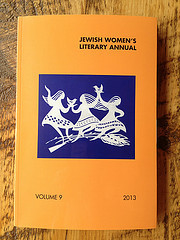 I'm always honored and delighted when my work appears in the Jewish Women's Literary Annual. This year I have a poem -- Mother Psalm 9 -- in Volume 9, which is the 2013 edition. (That poem is also available in my new collection Waiting to Unfold (Phoenicia, 2013).
I'm always honored and delighted when my work appears in the Jewish Women's Literary Annual. This year I have a poem -- Mother Psalm 9 -- in Volume 9, which is the 2013 edition. (That poem is also available in my new collection Waiting to Unfold (Phoenicia, 2013).
I'm also honored to be in such fine company. I've only begun to dip into this rich volume, but I'm savoring work by Marge Piercy (whose poem "Working at it" shows how "much in Tanakh is a mixed / bag, a tangled message"), Judith Barisonzi (whose poem "Moses" shows us one little girl on the cusp of the crossing of the sea), Marilyn Bentov (whose poem "Animals: Battles" chronicles a meeting with a tarantula -- I especially love the image of Esther, who loves pesticides: "'Fleet!' she'd scream with joy, / holding the can high above her head like a victorious // Moses battling Amalek in the Sinai desert"), Sheryl L. Nelms (whose poem "In the Seguin Cemetery" does beautiful things with very, very short lines) and Arlyn Miller (whose poem "Gathering the Waters" is subtitled "Guidance upon retirement or loss," and begins "Approach the water. Bring who you are / and what you have lost...")
It's also particularly delightful for me to share these pages once again with Vicki Pieser, whose short essay about a visit to Cuba is sharp, powerful, and poignant. She's also my aunt, and I love that we're published here together! (She doesn't have a website, but if you're interested in her work, don't miss her essay Travels With Joshua, about exploring the world with her autistic son.)
You can learn more about the annual, and subscribe / order copies, here at the National Council of Jewish Women website. Thanks to the editors for including my work!
June 21, 2013
Meditation to prepare ourselves for Shabbat
The Shabbat bride is on her way and she'll be here at sundown tonight!
In the understanding of our sages and mystics, Shabbat isn't just a day off from work. It's a day of cosmic alignment, a day when creation is irrigated with blessing. And we have a role to play in that process.
Think back on the week now ending. Start with last Sunday: what did you do on Sunday? What was sweet, and what was bitter? Where did you live up to your hopes, and where did you miss the mark?
And then let it go.
Remember Monday. What was good, what was difficult, where did you shine, where did you fail? And then let it go.
Tuesday. Wednesday. Thursday. Today. Turn the days over in your mind like pieces of sea glass in your hand, holding each one up to the light to see where it gleams and where it's flawed. And then let them all go.
Do you want to thank someone for a kindness this week? Reach out and do so. Do you need to apologize to someone for a place where you erred this week? Reach out and do so.
Seal the week's sweet memories in your heart; release the week's bitter memories from your consciousness.
In this way, you clear out the channels of your heart, mind, and soul. You're washing out the pipes, as it were, ensuring that nothing is blocking the flow of blessing from coming into your life -- and, through you, into the world.
Our tradition teaches that we each receive an extra soul, or an extra portion of soul-awareness, on Shabbat. When you light candles tonight, take a deep breath and feel the expansiveness of that second soul settling in. And then open your heart and let blessing, joy, and kindness flow from God into you, and from you into everyone you meet.
Join me on Sunday in Great Barrington for poems and conversation
Join me this coming Sunday at the Book Loft bookstore in Great Barrington for a south county reading from my new collection of poems. I'm happy to answer questions and share some conversation, as well as to sign books. I hope you'll join us!
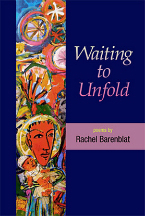
Sunday June 23, 6pm
Poetry reading and conversation / signing / Q-and-A
The Book Loft, 332 Stockbridge Road, Great Barrington
sponsored by MotherWoman and the Berkshire County Perinatal Support Coalition
Poet Rachel Barenblat (70 faces, Phoenicia 2011 and Waiting to Unfold,
Phoenicia 2013) will read from her new collection written during the
first year of parenthood, with booksigning and conversation / Q-and-A
(on subjects ranging from poetry and spirituality to postpartum
depression and parenting) to follow.
June 20, 2013
Praise for Waiting to Unfold - from the Berkshire Eagle
Many thanks to Nichole Dupont at Berkshires Week for writing, and to the editors at the Berkshire Eagle for assigning, this very gracious and thoughtful article about my work! It appears in Berkshires Week today, both in print and online; I'm reprinting it here with gratitude.
Poems held her in her son's first year
By Nichole Dupont, Special to Berkshires Week
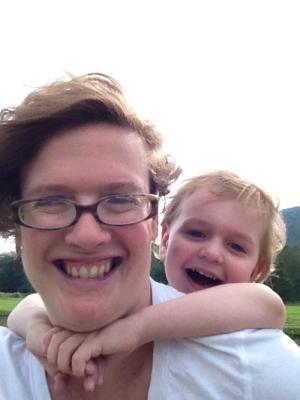
Rachel
Barenblat, published poet and rabbi at Congregation Beth Israel, holds
her son, Drew Zuckerman, now 3. (Photo courtesy of Rachel Barenblat)
LANESBOROUGH
-- When you're a new mother, your infant upends your world. And when
you're breast-feeding at 3 a.m., trying to soothe a colicky baby to
sleep, the night may seem endless.
Isolation and winter don't help either, according to Rachel
Barenblat of Lanesborough. Yet, through the thick fog of sleep
deprivation and a tenacious case of post-partum depression, Barenblat,
who is the rabbi at Congregation Beth Israel in North Adams and a
published poet with an MFA from the Bennington writing program, managed
to write a poem a week during the first year of her son's life.
"Waiting to Unfold" (Phoenicia Publishing, 2013) is a lyrical
collection of poetry that slices to the heart of parenting, capturing
everything from the banality (and humor) of changing diapers to the
ferocity of maternal protection to the nerve-ending jag of self-doubt.
But more importantly, Barenblat said, the book is a letter to her
now three-year-old son, Drew: a chronicle of memories that would
otherwise have been lost through the chaos and ritual of raising a
child.
"It's a little astounding. I find myself grateful to have written
these poems," Barenblat said. "I would have forgotten all this, but
when I read the poems it takes me back, right to that moment in time. I
recently gave a reading to a group of senior citizens, mostly women, who
haven't had children in the house for 50 or 60 years, but they said the
poems made them remember. There's something universal in this whole experience of mothering."
Despite what this modern culture of helicopter
parents and do-it-all women would have us believe, Barenblat said having
a newborn in the house isn't "all rainbows and unicorns." Many of the
poems from her collection address the shadowy specter of postpartum
depression. In "Besieged," she writes:
Seven weeks in
I am rubble, strafed
by a round-cheeked pilot
who attacks at random
with his air-siren wail.
These words are music to Jane Shiyah's ears. Shiyah is a recently
retired school councilor (from Lanesborough Elementary), and also a
member at Congregation Beth Israel. She has taken to memorizing lines
from her rabbi's poetry book, almost a means of spiritual comfort.
"I wish there had been a mother-mentor who put this book in our
hands when I was a new mother," Shiya said. "It touches on everything
that's a challenge. There's so many things that women don't talk about
-- miscarriage, depression, nursing. When you have a baby, there's
nothing you can do but respond, no matter how exhausted you are. And
here is Rachel, who is a rabbi, who has enormous faith, and even that
wasn't enough when she was going through her hardest time."
But Barenblat did get through it, thanks in part to her her
husband and her mother-in-law, who held Drew while his mother slept, and
to Barenblat's own mother, who, on a visit from Texas, when Drew was
just two months old, told her frazzled daughter that something was
definitely wrong.
"She said ‘this is harder for you than it should be. You need to
get help,' " Barenblat recalled. "At the time I didn't think things
would get better. I thought that our lives, mine and my son's, would be
like that indefinitely. It was an unbelievable relief when I got help.
Within a matter of weeks my life had changed completely. I was no longer
trapped in a bubble."
What Barenblat was able to put into eloquent, published words,
most mothers don't allow themselves to even mention. This is why Liz
Friedman, program director of MotherWoman -- a global support and
advocacy group which is sponsoring book-related events, wants a copy of
"Waiting to Unfold" to make it into the hands of mothers (and everyone
working with new mothers). Just recently, Friedman brought some of the
poems into a training she headed that focused on perinatal emotional
crisis, which effects at least 50 percent of new mothers.
"We're trying to create an environment where women can speak and
providers -- WIC administrators, pediatricians, OBGYNs -- are equipped
to handle postpartum depression," Friedman said. "And what is always
important for us as providers is to know women's stories. [Rachel] is
putting a voice in our lived experiences. She names it. And there's a
whole lot of love in that book of poetry."
And a whole lot of Drew. According to Shiya, since the boy's
birth, her gentle rabbi has a new kind of spirituality, no matter the
occasion.
"During the services, or in Torah study, there is always some
reference to something about her and her son," she said. "She cannot
separate her two lives. Nor should she. He belongs there, even when he's
not there. He reminds her of something beautiful."
If you go ...
What: Poetry reading
When: Sunday, 6 p.m.
Where: The Book Loft,
332 Stockbridge Road,
Great Barrington
Admission: Free
Information: (413) 528-1521 www.thebookloft.com,
Rachel Barenblat's blog:
velveteenrabbi.com
Psalm before the summer solstice
Day Before the Solstice
a psalm of thanksgiving
For sky as implausibly blue
as a plastic kiddie pool,
scrawled with the white streaks
of self-erasing contrails.
For grass stretching up,
for the rustle of oak and birch,
for sumac spreading its canopy
over blackberry and wild grape.
For this canvas umbrella
once red as a tomato
now leached by sun
to Nantucket pink.
For cold coffee, milky
as a silted river
and sweet as birdsong,
ice cubes rattling in my glass.
Rachel Barenblat's Blog
- Rachel Barenblat's profile
- 6 followers



